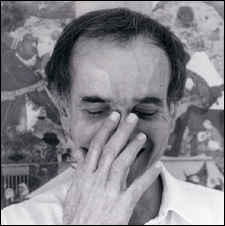Local poet, teacher George Starbuck honored
Witty poet remembered for inventing forms, re-writing Shakespeare
George Starbuck (1931-1996) is a poet known for his wit, intelligence, and precision; he was the winner of the Yale Series of Younger Poets prize for his first book of poems and director of writing programs at the University of Iowa

and Boston University. A new collection of Starbuck’s poetry, “The Works: Poems Selected From Five Decades” (University of Alabama Press, 2003) edited by Kathryn Starbuck and Elizabeth Meese, was recently published. In recognition of Starbuck’s return to print, as well as his influence on poets locally and around the world, The George Edward Woodberry Poetry Room will host “A Tribute to George Starbuck: The Works,” Thursday, Feb. 26, at 7 p.m. in the Woodberry Poetry Room, Lamont Library. The tribute will include readings and remembrances by the poet’s former students and colleagues including Kathy Starbuck, Maxine Kumin, Peter Davison, Emily Hiestand, Mary Baine Campbell, and Askold Melnyczuk.
Don Share, curator of the Woodberry Poetry Room, said, “George Starbuck was a renowned figure from the great era of the Boston/Cambridge poetry giants and I was lucky to study under him at Boston University. By the time I’d become a student of his, he was … legendary. He managed to be both cutting edge and a
‘A Tribute to George Starbuck: The Works’ will take place Thursday, Feb. 26, in the Woodberry Poetry Room, Level 5, Lamont Library, at 7 p.m. Free and open to the public. Call (617) 495-2454 for more information.
keen master of traditional forms. It is hard to think of a more ingeniously energetic poet or teacher, and he unleashed generations of writers who have changed the landscape of American poetry.”
Starbuck addressed profound issues of his day with wit and cunning. A master of forms, he left behind a variety of new forms, including his Standard-Length-and-Breadth-Sonnets, known as SLABS, and he famously rewrote some of Shakespeare’s sonnets by eliminating all but few words, and published them in a pamphlet whose full title was: “Space-saver sonnets : purged of accretions & newly published in the corrected hemimeter version, prepared under the general folgership of George Starbuck.”
Starbuck once said, “For me, the long way round, through formalisms, word games, outrageous conceits (the worst of what we mean by ‘wit’) is the only road to truth…. Put another way: I have a conscious slavery to the language. The only alternatives are unconscious slavery, or the sainthood of the wholly silent.”




